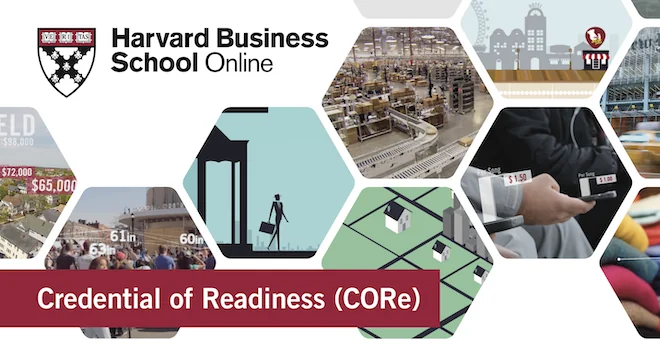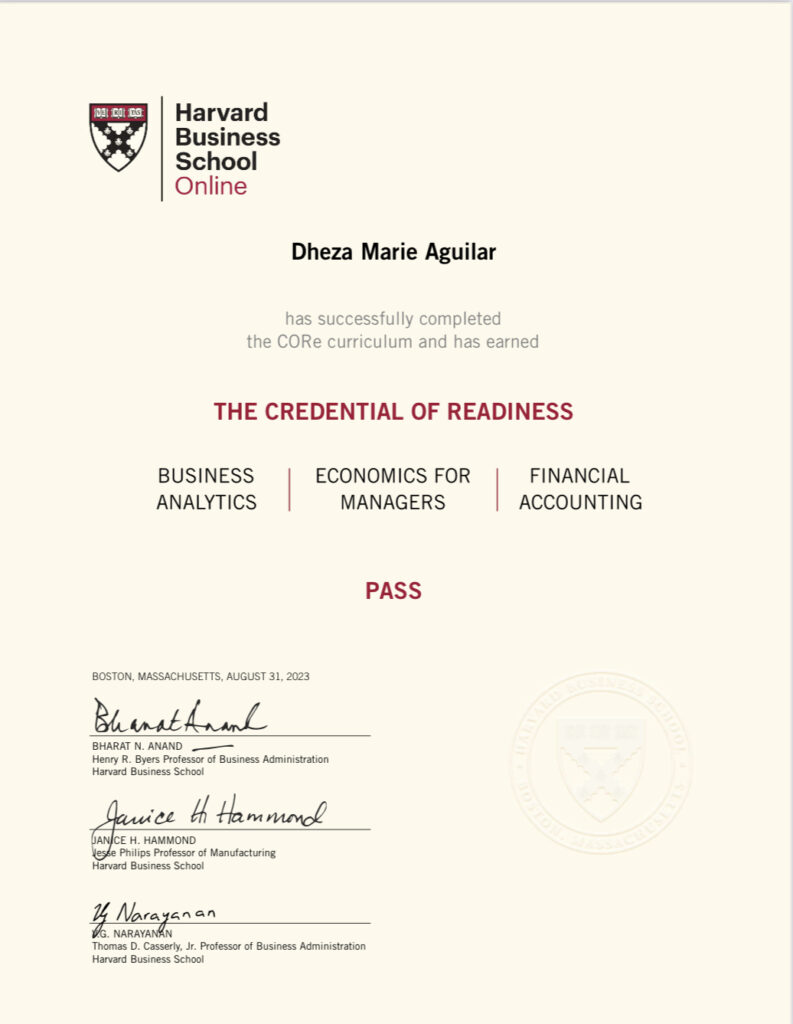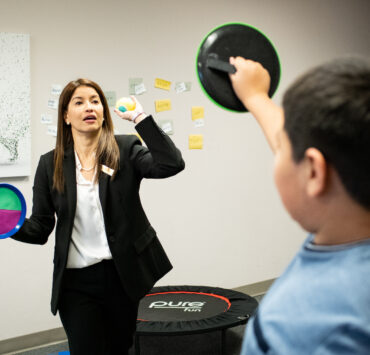TFEM’s Managing Editor spent one summer taking Harvard Business School Online’s CORe programme. A review of how an online course can be a tool to further education.
Until moving to the Netherlands in 2009, my bread and butter had been writing stories (for magazines and newspapers) or telling stories (through television productions). It is a career that, no matter how much I wanted to pursue in the Netherlands, I didn’t dare to.
Despite being an expat with a university education, I had to start from zero. I wanted to prove “worthiness” in a society where a person’s job (and job title) defines who s/he is. I focused on finding a job immediately to become financially independent.
If you live in the city of Rotterdam, you’ll almost certainly drift into the world of maritime, logistics and supply chain. In this industry I found a job, and I stayed.
But after 14 years, it began to itch. I wanted to have a more holistic understanding of this small company I am working for, and not just the part I am handling. But I do not have the time or the desire to go back to school for another four years of economics or finance degree. Nor do I wish to climb any corporate ladder in the future. Once my mortgage has been paid off, I will go back to writing and telling stories.
“I am 39 years old, and it was time to step out of the shadows of my high school failures.”

The Harvard CORe programme
The opportunity for further learning in finance and economics presented itself in the form of Harvard Business School Online’s Credential of Readiness (CORe). I stumbled upon this program, thanks to HBS’s effective LinkedIn marketing.
CORe is Harvard’s first foray into Massive Open Online Courses (MOOCs), banking on its reputation as a prestigious business school, and making Harvard-pioneered Case Study Method accessible to online education.
There’s just one catch… numbers scare me. It is an aversion I developed in high school when I was removed from the top class for getting a B in Algebra. But I am 39 years old, and it was time to step out of the shadows of my high school failures.

Enrolling in Harvard’s CORe
In April I applied for the 10 to 12-week course instead of the 17-week extended programme, thinking that I had enough time during the summer to study. My employer generously shouldered the €2,500 tuition fee, putting more pressure in getting a certificate.
To get an HBS CORe certificate you need to earn passing grades, including the final exam. You cannot retake the final exam. If you fail, you cannot retake the programme. You need to pass all three courses, and if you fail one, you won´t be awarded a CORe credential.
I thought I had a good strategy. I’d approach this as a good planner. I’d take CORe in June 2023, just before the summer holiday when the shipping world, at least in Europe, slows down a bit. Then I’d be spending my 3-week summer holiday studying. By the end of the summer, I’d be ready for the final exam.
And exactly like how shipping works, plans change, usually at the last minute. One colleague left in April, another took a month off in May and a 3-week holiday in August, and another went for a 6-week paternity leave from July to August. That’s basically my whole team!
So from June 20th until the final exams on September 22, I spent every waking hour, afternoons after work, evenings after putting my kid to bed, every weekend, and literally my whole summer holiday studying, studying and studying.
The 150 study hours Harvard said you need to dedicate to CORe are totally underestimated. I must have spent more than 300 hours studying. Throw in parental duties, publishing tasks, and a six-week bout with a lung infection, and you’ve got a recipe for burnout.
By the end of the summer I was so exhausted that I didn’t care anymore whether I’d pass or not. I just wanted to finish the course.

Is Harvard CORe difficult?
Yes, it was tough for me. Like I said, I didn’t have prior business or science education and I graduated 18 years ago!
But the biggest hurdle was time. Studying intensely for 10-12 weeks while juggling a full time job, parenting, side-business, home-making (basically regular life) is a tough act.
You’re required to complete two graded homework weekly, write graded reflections, and interact with your peers (also graded). The deadlines are insane, and I am no stranger to deadlines. If you don’t complete your weekly homework on time, you´ll get a 0 score, which weighs in on your final grade.
Each course requires lots of calculations, additional research and an analytical mind. For example, there are a lot of essay/reflection questions that require a minimum and maximum number of words before they are accepted. You cannot move on to the lesson if you don’t answer them. If you cannot move on to the next syllabus, you are not allowed to do the homework. Or the next lesson. Or the final exam.
You would think that this is a part that you can just copy paste an answer from Google. But what’s the fun in that? The essay and reflection questions are, I think, some of the most engaging parts of the programme, where all the accumulated learnings are applied to your answers.
There are also what they call “cold calls”, where you need to answer a question within 1-2 minutes. They are like mini exams that give you as much jitters as the final exam.
The amount of videos and reading materials was overwhelming. If I hadn´t been studying in between lunch breaks at work, I wouldn´t have been able to finish all the materials required for the end of module homework.
Even if this is categorized as a self-paced study, Harvard has complete control of user experience. Due to time-constraint, it is compulsory to complete study tasks if you want to finish the course. Finishing doesn’t guarantee passing or a certification because 50% of the final grade depends on the final exam.
“When you think about the cost of doing something, think about what you are giving up by not doing other things.”
Professor Bharat Anand on opportunity cost.
The final exam
The final exam was difficult. For each course, you get 45 questions and 60 minutes to answer them, basically 1.34 minutes per question. And while it’s a multiple-choice exam, you still need to do A LOT of computations, even in the Economics course (but a lot less than Analytics and Accounting). The final exam is online and not proctored.
If there is one strategy I learned at CORe, it is that you have to read the questions carefully and understand the question properly. Some questions are designed to confuse you so that you can demonstrate mastery of the subject.
I was convinced that I’d fail. In my head, I was already writing an article entitled “I failed HBS CORe”, applying the concept of “sunk costs” to justify failing, which I would post on LinkedIn where no one ever failed CORe.

Would I recommend HBS’s CORe?
Definitely! Coming from a creative background, studying Harvard’s CORe was like rewiring my brain to think in numbers and analytics.
The programme also helped me to understand the decisions of my employer better, and I think it will sharpen the decisions I will be making within the company in the future.
Economics for Managers was the course I enjoyed the most. There are so many lessons that also apply to life as well. The principles of efficiency and equity, and the complicated reality of achieving balance between the two stayed with me.
Financial Accounting was the most useful. I learned to read, understand and interpret balance sheets, income statements, cash flows, the principle of debit and credit, and valuations.
Business Analytics was surprisingly fun. I never expected that I would enjoy doing hypothesis testing and regression exercises. If my Math classes were taught this way in high school and college, I probably wouldn´t have hated Math then.
Thanks to Harvard’s CORe, numbers don’t scare me anymore.

Passing Harvard’s CORe
The course will ask a lot from you, time, effort and brain power. You need grit and dedication. But it will be worth it.
Here are some of my tips for passing Harvard’s CORe:
- If you are juggling several roles in your daily life, the 17-week extended programme is a better option, for your sanity. It will give you more time to study and enjoy CORe.
- Brush up on your calculus and statistics before applying. It will be a lot easier to understand Business Analytics when these math lessons are still fresh in your mind.
- Get a scientific calculator. You need it for the amount of computing you need.
- Harvard will provide you with a course calendar. Incorporate this well in your daily agenda. Allow at least 20% more time than you initially planned so that you can easily catch up should unforeseen changes occur.
- Don’t be shy to ask for help or feedback, from your cohorts to your friends. Thankfully for me, I have a husband who is good at statistics and a best friend who has a degree in Economics.
- Take a break, at least half a day weekly to get away from studying. The brain can only take so much information.
- Enjoy the programme. You will learn a lot, that is guaranteed!
- Celebrate your learning. Even if you fail for whatever reason, the lessons will be valuable in your career.
But don’t take my word for it. Here are some other references if you want to understand the course content better:
Everything You Need to Know About Harvard CORe – Credential of Readiness
How difficult is Harvard’s HBX CORe?
My Thoughts on Harvard Business School’s Credential of Readiness
Good luck!




